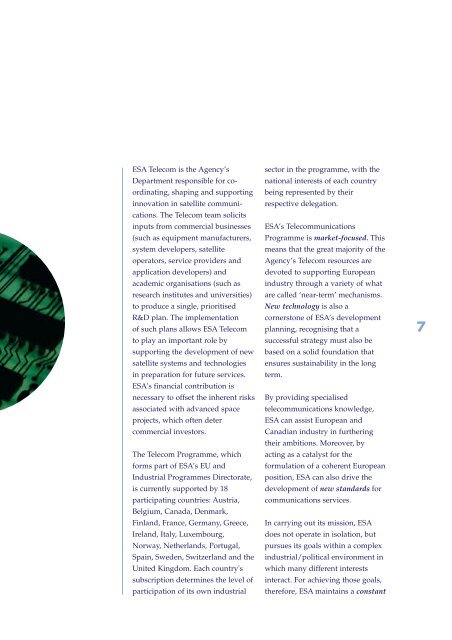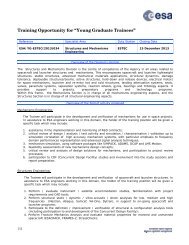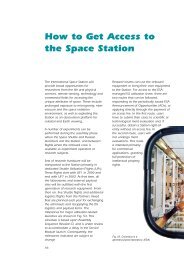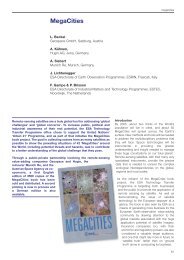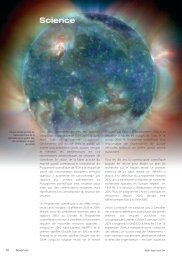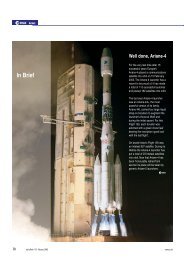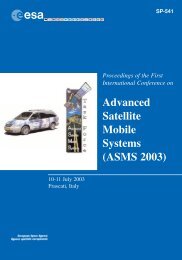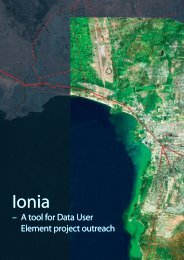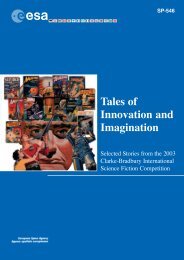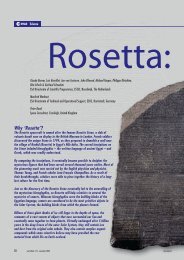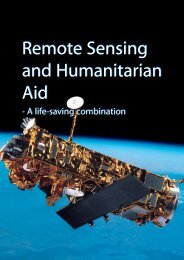Business with ESA Telecom
Business with ESA Telecom
Business with ESA Telecom
You also want an ePaper? Increase the reach of your titles
YUMPU automatically turns print PDFs into web optimized ePapers that Google loves.
<strong>ESA</strong> <strong>Telecom</strong> is the Agency’s<br />
Department responsible for coordinating,<br />
shaping and supporting<br />
innovation in satellite communications.<br />
The <strong>Telecom</strong> team solicits<br />
inputs from commercial businesses<br />
(such as equipment manufacturers,<br />
system developers, satellite<br />
operators, service providers and<br />
application developers) and<br />
academic organisations (such as<br />
research institutes and universities)<br />
to produce a single, prioritised<br />
R&D plan. The implementation<br />
of such plans allows <strong>ESA</strong> <strong>Telecom</strong><br />
to play an important role by<br />
supporting the development of new<br />
satellite systems and technologies<br />
in preparation for future services.<br />
<strong>ESA</strong>’s financial contribution is<br />
necessary to offset the inherent risks<br />
associated <strong>with</strong> advanced space<br />
projects, which often deter<br />
commercial investors.<br />
The <strong>Telecom</strong> Programme, which<br />
forms part of <strong>ESA</strong>’s EU and<br />
Industrial Programmes Directorate,<br />
is currently supported by 18<br />
participating countries: Austria,<br />
Belgium, Canada, Denmark,<br />
Finland, France, Germany, Greece,<br />
Ireland, Italy, Luxembourg,<br />
Norway, Netherlands, Portugal,<br />
Spain, Sweden, Switzerland and the<br />
United Kingdom. Each country's<br />
subscription determines the level of<br />
participation of its own industrial<br />
sector in the programme, <strong>with</strong> the<br />
national interests of each country<br />
being represented by their<br />
respective delegation.<br />
<strong>ESA</strong>’s <strong>Telecom</strong>munications<br />
Programme is market-focused. This<br />
means that the great majority of the<br />
Agency’s <strong>Telecom</strong> resources are<br />
devoted to supporting European<br />
industry through a variety of what<br />
are called ‘near-term’ mechanisms.<br />
New technology is also a<br />
cornerstone of <strong>ESA</strong>’s development<br />
planning, recognising that a<br />
successful strategy must also be<br />
based on a solid foundation that<br />
ensures sustainability in the long<br />
term.<br />
By providing specialised<br />
telecommunications knowledge,<br />
<strong>ESA</strong> can assist European and<br />
Canadian industry in furthering<br />
their ambitions. Moreover, by<br />
acting as a catalyst for the<br />
formulation of a coherent European<br />
position, <strong>ESA</strong> can also drive the<br />
development of new standards for<br />
communications services.<br />
In carrying out its mission, <strong>ESA</strong><br />
does not operate in isolation, but<br />
pursues its goals <strong>with</strong>in a complex<br />
industrial/political environment in<br />
which many different interests<br />
interact. For achieving those goals,<br />
therefore, <strong>ESA</strong> maintains a constant<br />
7


